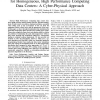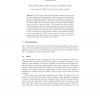602 search results - page 106 / 121 » Unsupervised Problem Decomposition Using Genetic Programming |
117
click to vote
ICALP
2001
Springer
15 years 6 months ago
2001
Springer
Abstract. If the genetic maps of two species are modelled as permutations of (homologous) genes, the number of chromosomal rearrangements in the form of deletions, block moves, inv...
139
click to vote
MICRO
2005
IEEE
15 years 7 months ago
2005
IEEE
Scheduling algorithms used in compilers traditionally focus on goals such as reducing schedule length and register pressure or producing compact code. In the context of a hardware...
166
click to vote
AI
2002
Springer
15 years 2 months ago
2002
Springer
Neural network ensemble is a learning paradigm where many neural networks are jointly used to solve a problem. In this paper, the relationship between the ensemble and its compone...
103
click to vote
TPDS
2008
15 years 2 months ago
2008
High Performance Computing data centers have been rapidly growing, both in number and size. Thermal management of data centers can address dominant problems associated with cooling...
130
click to vote
AE
2005
Springer
15 years 7 months ago
2005
Springer
Most of the Evolutionary Algorithms handling variable-sized structures, like Genetic Programming, tend to produce too long solutions and the recombination operator used is often co...



